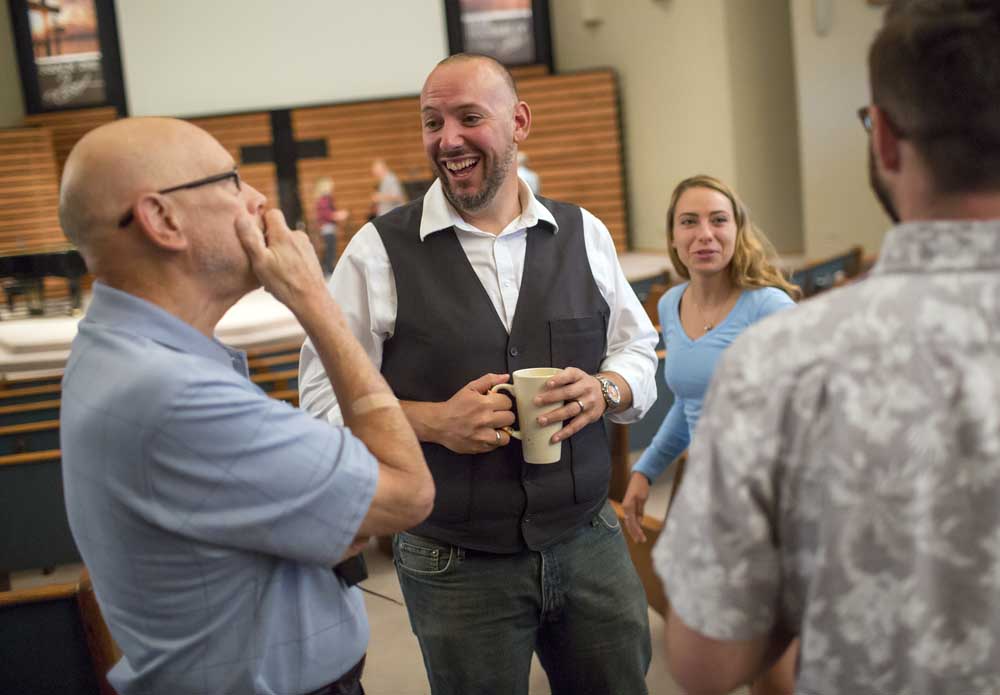Holy headhunting: Search firms find new pastors
Published 12:00 am Saturday, September 12, 2015

- Brian Cassella / Chicago Tribune / TNSThe Rev. Andrew Powell, second from left, greets parishioners at Grace Baptist Church in Mahomet, Illinois. Powell became Grace’s senior pastor in 2012 after the church used a minister search firm. Search firms are gaining popularity, especially in nondenominational churches that lack a historical hierarchy to fill roles.
CHICAGO — On a Sunday in September, Winnetka (Illinois) Congregational Church is scheduled to affirm its new senior pastor, Jeffrey Braun, who is expected to begin leading the 141-year-old institution a few weeks later.
Braun came from a church about 900 miles away in Connecticut, and he wasn’t looking for a job when the North Shore church went searching.
A minister headhunter delivered him.
“It became clear to me that he really knew what he was doing,” said LeAnn Pope, who helped lead the church’s search committee, about William Vanderbloemen, CEO of the pastoral search firm that bears his name. “We’re ecstatic about Pastor Braun. I think he’s going to be a fabulous fit.”
In a trend that reflects the rising popularity of nondenominational churches, an increasing number of Christian institutions are embracing minister search firms, which borrow from the corporate executive-search model but must navigate a decidedly different landscape.
When Minister Search, considered the first pastoral headhunting firm, began in 2001, founder David Lyons didn’t land a single client his first year. In recent years, he said, his firm places 30 to 50 ministers annually.
Vanderbloemen said his firm, which launched in 2010, has experienced annual growth of 50 percent in placements and revenue in recent years and has completed 753 successful job searches in that time. Other search firms report similarly brisk business.
“It makes sense,” said Scott Thumma, director of Hartford Institute for Religion Research, who has written extensively about nondenominational congregations. He said pastor search firms are particularly logical approaches for nondenominational churches, which typically lack a hierarchical organization to assign pastors or help with vacancies.
It is a practice that has taken hold among nondenominational churches in the Chicago area and elsewhere. Moody Church in Chicago is using a search firm to find a successor for its senior pastor, Erwin Lutzer, who is retiring. Willow Creek Community Church in South Barrington found a campus pastor through a search firm. And Grace Baptist Church in east-central Mahomet, Illinois, used one to find its senior pastor, who later tapped the same firm to find a youth pastor.
Placing ministers with churches involves “a ton more variables” than corporate recruiting, said Greg Allen, president of the Shepherd’s Staff, based in Dallas. Candidate and church must align theologically and on issues such as politics, homosexuality, even alcohol consumption, search executives say.
For recruiters, it’s lower-paying than corporate work but also more fulfilling for many.
“I really believe that my role isn’t to be a headhunter but to be a heart hunter,” said Rob Lauer, president of Agora, based in Colorado Springs, Colorado, which is working with Moody Church to find its senior pastor.
Winnetka Congregational is a “lay-led, nondenominational Protestant church” with about 800 “very pragmatic” members that was established in 1874, Pope said. When its pastor, Joseph Shank, retired in June 2014 after more than two decades, search committee members thought they might find a corporate recruiter who could help fill the position, Pope said.
Committee members had no idea minister search firms existed, she said. Then they found Vanderbloemen, who had served as a minister for about 15 years and worked in executive recruiting. He combined those experiences to form Houston-based Vanderbloemen Search Group. One of his previous clients is Willow Creek Community Church.
His company signed a contract with Winnetka Congregational Church in October and delivered a final slate of candidates to the search committee in March, Pope said. Braun signed a contract in late July, she added.
The firm starts the minister search process in a number of ways, but leads typically come from churchstaffing.com, an online clearinghouse of church-related job openings and job hunters. Firms also market their services to churches and pastors, regardless of whether they are in the job market.
A search firm usually makes a weekend visit to the church to assess its needs, while prospective candidates complete detailed questionnaires and are vetted by the firm. One company makes sure a candidate and a church align on upward of 150 topics before an interview is scheduled.
Search firms charge churches about one-third the compensation of the minister job they are helping to fill, firm executives said. Those salaries often fall between $75,000 and $125,000, which yields a fee of $25,000 to about $42,000 per search.
The Rev. Andrew Powell appreciates the effectiveness of pastoral search firms. Minister Search brought him to the attention of Grace in Mahomet, which hired him as senior pastor in 2012.
The preliminary review was so thorough, Powell said, that he and church leaders were able to “get the jargon and Christian-ese out of the way” and discuss core concepts to determine if he and the church were suited for each other.
When Grace needed a student pastor, the church again used Minister Search, which brought them a candidate the church hired in January. It didn’t work out, and Grace is using Minister Search to find a new student pastor — at no charge.
Although the number of churches using search firms is growing and expected to continue to do so, the practice can ruffle the feathers of some flocks. Some church leaders view the companies as an inappropriate corporate encroachment in the spiritual realm, a business practice for a journey that should be led exclusively by prayer and trust in a higher power.
Lyons, of Minister Search, recalled a church official telling him that pastor search firms were “with the devil.”
He and others who run the firms said they are doing God’s work. They noted that seminaries don’t teach hiring practices or career management, and that church search committees almost always are composed of volunteers who lack skills to find and interview qualified candidates.
Furthermore, pastor search executives said, churches use outside businesses for investments, real estate issues, legal questions, building renovations and construction. Pastor recruiting is another example of tapping independent expertise.
William Bertsche, Moody’s executive pastor, said he and the seven-member search committee are “in no way trying to put the Holy Spirit out of a job. Prayer is built into the process. It goes hand in hand, just trusting the Lord with it.”
Braun, chosen for the job at Winnetka Congregational Church, said Vanderbloemen’s firm brought “a clarity and yet prayerful energy” to his odyssey.
“These are not businesspeople who have spelunked into the church realm,” Braun said. “These are church people who understand what churches need and what pastors need.”
He should know. Before enrolling in Yale Divinity School, Braun spent nearly a decade in advertising and marketing.






